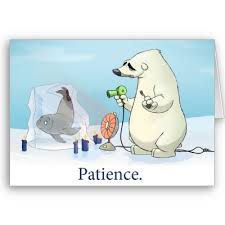 Some people seem born patient. Others feel impatient several times a day. You may sense it building before you express it. Once spoken, it can have negative consequences for those around you.
Some people seem born patient. Others feel impatient several times a day. You may sense it building before you express it. Once spoken, it can have negative consequences for those around you.
Learn to recognize your personal signs of escalating impatience: frustration, muscle tension, clenching teeth, anxiety, irritability, rushing and shallow breathing. They signal it’s time to step back and change your reaction.
Stop the cycle. Reacting to situations with anger and frustration may provide emotional instant gratification that is ultimately self-defeating. Accept those feelings for what they are, but practice responding in more positive ways.
Tune up self-talk. Impatience often results from the negative loop playing inside your head, which tells you “I don’t like this,” or “This isn’t going my way.” Slow down and tune into your inner voice during moments when you’re impatient; then find a way to manage that discomfort more successfully.
Take a break. When you’re feeling agitated, try to move away, mentally or physically. Take a walk, do relaxation stretches, call a friend, or spend time in quiet reflection. Once you are calm, return to the situation with a fresh outlook.
You can improve your emotional outlook by building good health: regular exercise, good nutrition and adequate sleep. You will have more patience when you are well rested and feeling your best.
“Patience is bitter, but its fruit is sweet.” — Aristotle
http://www.personalbest.com/TopPerformanceOnline/ViewIssue.aspx?issue=878
